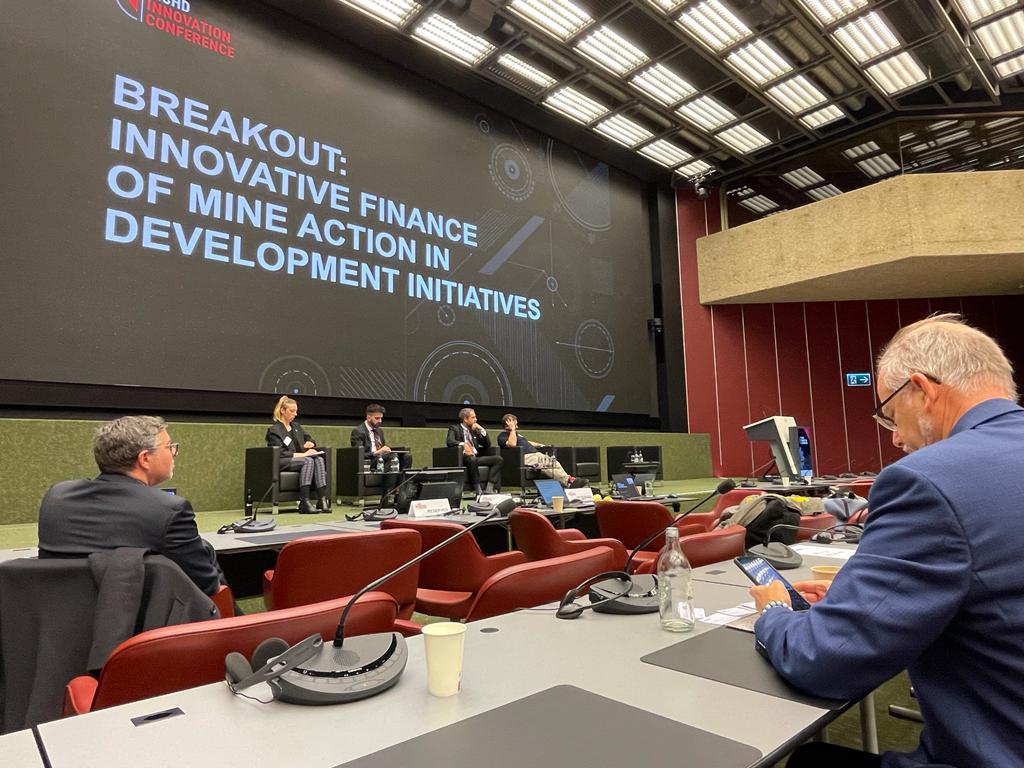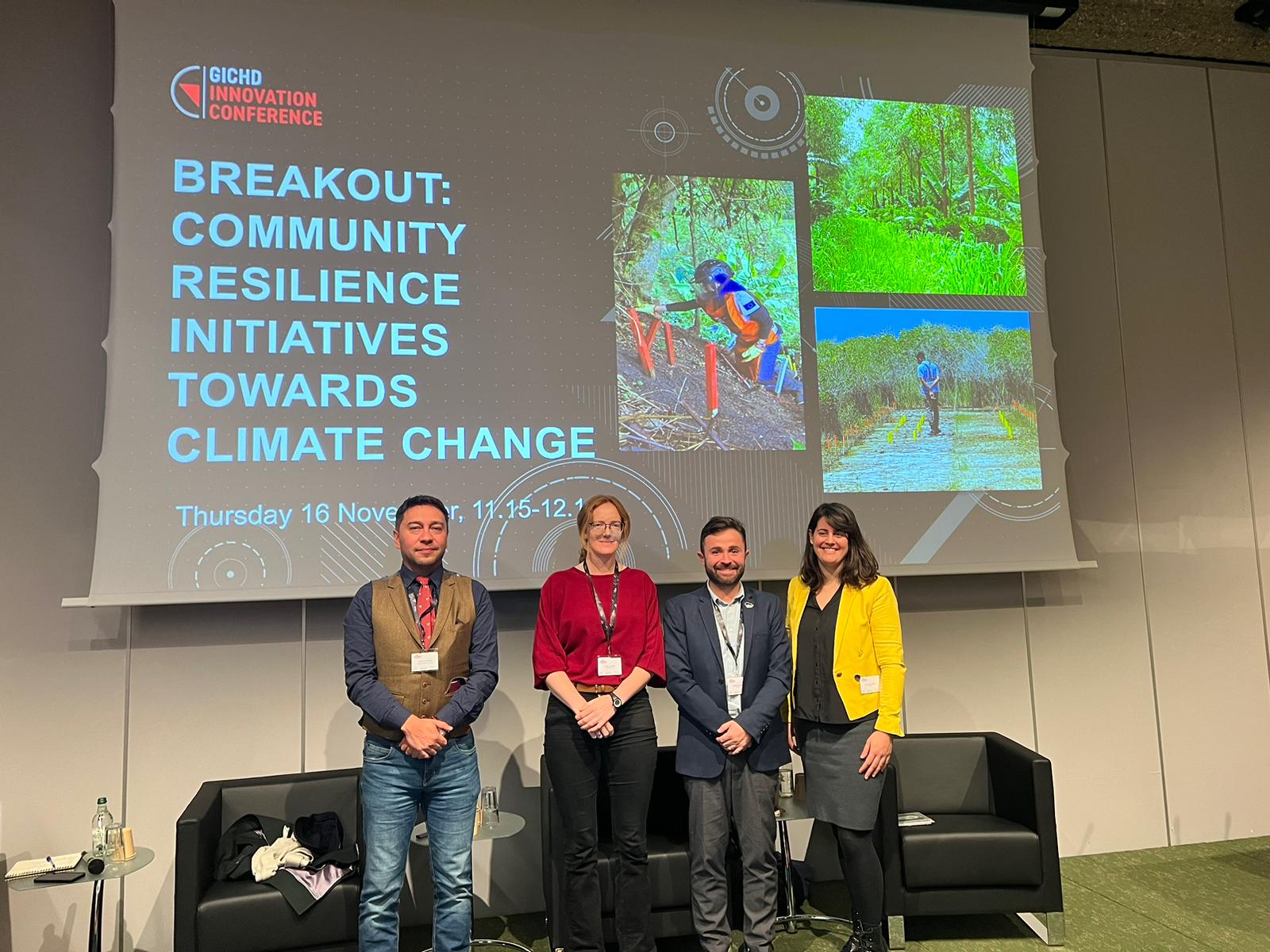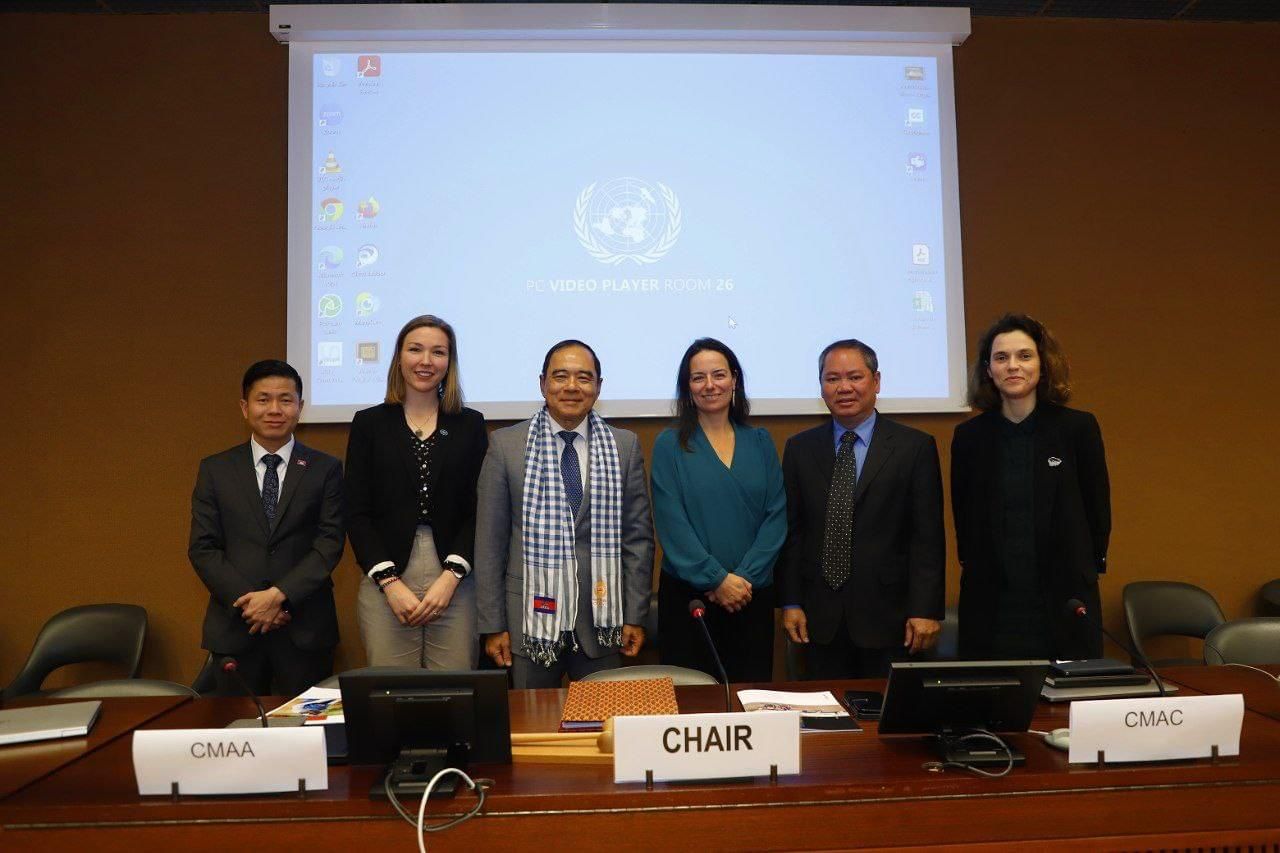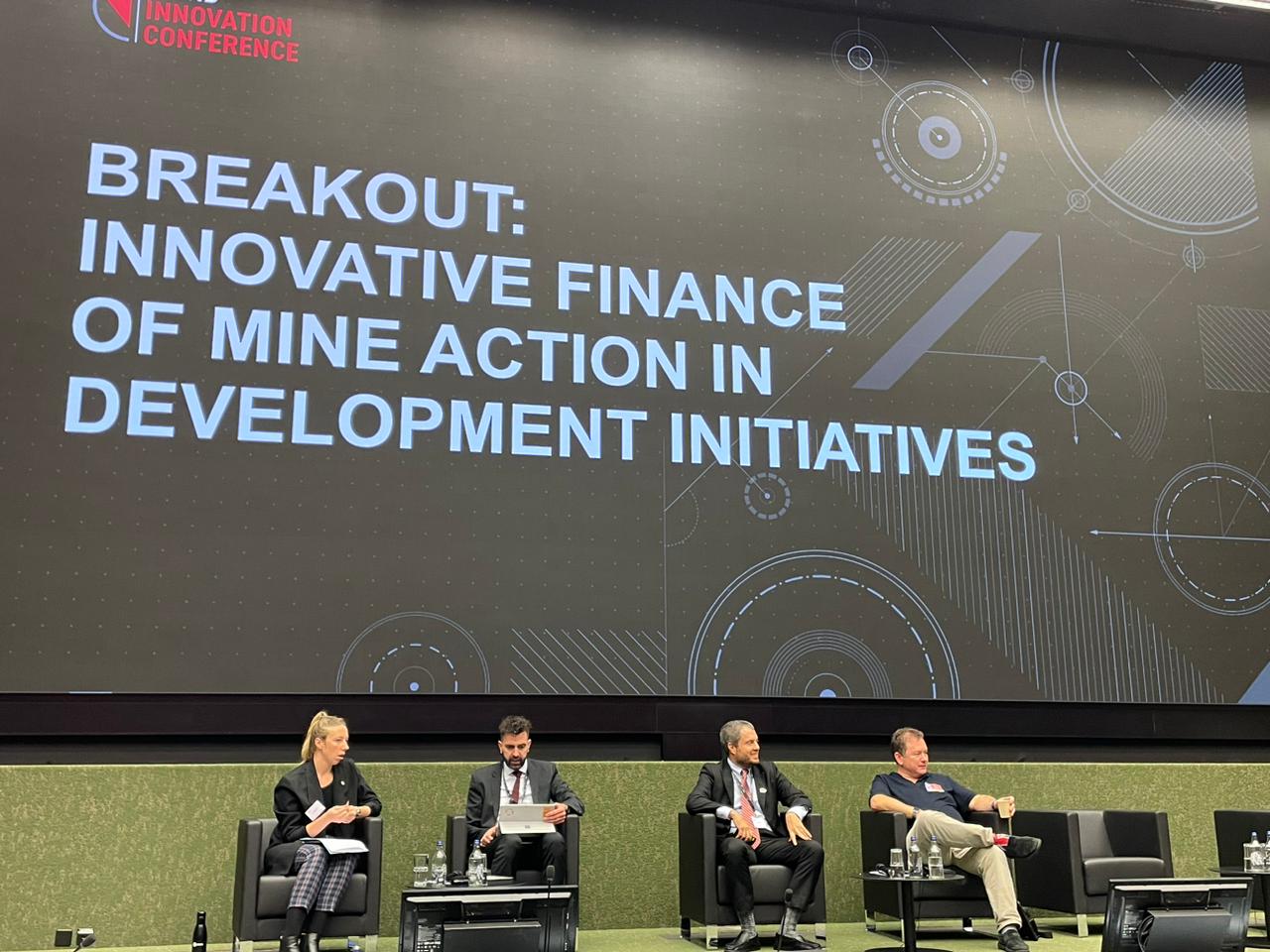APOPO recently presented its Mine Action Development Impact Bond (DIB), the HeroTREES project, and its private sector engagement strategy at the Geneva International Centre for Humanitarian Demining (GICHD) Innovation in Demining Conference and the Twenty-First Meeting of the States Parties.
Both conferences were held in Geneva, in the weeks of 9 and 16 November, respectively, and were attended by hundreds of global demining stakeholders. As a result of its growing reputation in the sector, APOPO was honored to showcase its unique and innovative mine action activities and projects at these global events.
Development Impact Bond Presentation at the GICHD Innovation Conference

Charlie Richter, APOPO’s US Director and one of the key developers and managers of the “MineFields to Ricefields” DIB project funded by the UK Government’s Foreign Commonwealth & Development Office (FCDO), joined a panel discussion on innovative financing in mine action.
The panel included representatives from the UK Government, the GICDH and a United Nations Development Programme (UNDP) expert on Ukraine. Charlie walked over 100 stakeholders through the design and unique financial flows of the project. He explained how APOPO tapped into its existing network of private foundations and impact investors, as well as a productive working relationship with partners Cordaid and Social Finance, to put together an Investor-ready DIB in near-record time. Charlie was also pleased to report on the project’s first promising results.
The “Minefields to Ricefields” project in Cambodia is a pioneering approach in humanitarian demining and development efforts. Launched in partnership with the FCDO, this initiative is designed to clear over 3.8 million square meters of land contaminated with landmines in Cambodia.
The project is notable for its use of a Development Impact Bond (DIB), a form of innovative financing aimed at achieving specific development outcomes. The “Minefields to Ricefields” DIB is particularly significant as it is the world’s first impact bond dedicated to mine action, uniquely integrating clearance of landmines and agricultural development.
With a budget of £1,395,000, the project aims not only to address the immediate danger of landmines but also to contribute to broader agricultural development once the potentially productive land is cleared of mines and unexploded ordnance. This aligns with Cambodia’s commitment under the Ottawa Treaty to eliminate all landmines from the country.
HeroTREES Presented at GICHD Innovation Conference

Michael Heiman, APOPO’s Head of Mine Action, presented APOPO’s HeroTREES program at the GICHD Innovation Conference during a panel discussion on leading humanitarian mine action organizations’ environmental and climate practices.
Sharing the stage with colleagues from the Halo Trust and Campana Colombiana Contra las Minas, Michael presented APOPO’s Syntropic Farming Program, known as HeroTREES, along with its benefits to local communities, and APOPO’s experiences in Tanzania and Zimbabwe.
APOPO’s HeroTREEs project is an integral part of the organization’s environmental efforts, particularly in Tanzania’s Uluguru Mountain Forest, a key area for biodiversity conservation in Africa. In collaboration with Sustainable Agriculture Tanzania (SAT), the project trains local farmers in sustainable organic agro-ecological practices. These efforts aim to improve soil and water quality, increase food security, reduce poverty, and preserve the region’s rich biodiversity. The initiative addresses the challenges faced by farmers, such as limited resources and harsh weather conditions, which have historically led to deforestation through slash-and-burn agriculture.
The project’s approach involves teaching farmers sustainable land revitalization methods, including planting trees alongside crops and using smart organic agriculture techniques to produce natural fertilizers. This strategy leads to higher crop yields, increased income, and enhanced food security, contributing to resilience against climate change. The planting of indigenous trees also plays a crucial role in CO2 sequestration and maintaining biodiversity. With the ambitious goal of training hundreds of farmers and planting 50,000 trees over five years, HeroTREEs is working towards reducing poverty and improving environmental sustainability in the region, helping to preserve a globally significant ecosystem.
The HeroTREES program has a relatively low cost and boosts the income of, and offers nutritional benefits to, both civilian populations and local demining staff involved in landmines and other explosive devices clearance activities. Michael also encouraged other demining organizations present at the conference to contact APOPO to start their own syntropic Farming initiatives.
Private Sector Engagement at the State Parties Convention

Anna Bouchier, Director of the APOPO Swiss Foundation, was invited to speak at the Mine States Parties Convention hosted by the United Nations in Geneva, together with The Halo Trust, the Cambodian Mine Action Center (CMAC) and the Cambodian Mine Action and Victim Assistance Authority (CMAA).
The sideline event was organized by the CMAA in the context of its upcoming presidency of the Anti-Personnel Mine Ban Convention (AMBC) and focused on the potential of private sector engagement to support mine action.
The Twenty-First Meeting of the States Parties (21MSP) to the Convention on the Prohibition of the Use, Stockpiling, Production, and Transfer of Antipersonnel Mines and on Their Destruction was the result of a diplomatic effort that brought together the international community to combat the scourge of landmines globally. This formal meeting, which involved 164 states that are parties to the Ottawa Treaty, served as the last formal gathering before the Fifth Review Conference of the Convention.
The Ottawa Treaty is a critical international agreement focused on landmine removal, stockpile destruction, and eliminating the use and impact of antipersonnel landmines globally.
At the event, Anna presented the hybrid funding ecosystem that APOPO has established over the years, which promotes sustainability, stability and financial resilience. She also introduced the “Minefields to Ricefields” DIB as a financial innovation that bridges the gap between the private and public sectors and encourages Mine Action to focus on development rather than immediate results of clearance of landmines.
“It was a great honour to be invited by CMAA to speak on their panel. The event was a true illustration of the strong relationship we share with Cambodia, and our dedication to support them throughout their upcoming APMBC presidency and beyond. We were proud to present the innovative hybrid funding ecosystem we designed over the years and to see the interest from the industry in the involvement of new actors, to reach our common goal to rid the country of landmines by 2025,” Anna said of APOPO’s participation.
The presentation was very well received, raising some interesting questions about the DIB and the role of institutional donors in partnering with private actors. APOPO was proud to be part of the event and looks forward to continuing to support the CMAA in their mine action efforts in Cambodia and throughout their presidency in 2024.
Engagement and Learning at the Conferences
Engaging with organizations such as The HALO Trust and Campaña Colombiana Contra Minas (CCCM) was a highlight of the GICHD conference. These interactions provided us with valuable insights into different strategies for resilience against climate change and further affirmed the importance of innovative approaches in our work.
Our individual projects like the DIB in Cambodia and the HeroTREEs program, while focused on specific objectives, contribute to a broader global effort in humanitarian work. We recognize the crucial role of collaboration and shared learning with other organizations in enhancing the effectiveness of humanitarian efforts globally.
Looking Forward
APOPO is mindful of the challenges ahead and we remain dedicated to our mission. Our participation in events like the GICHD and States Parties conference is key to staying informed and adapting our methods to meet the changing needs in the fields of humanitarian demining and environmental conservation.


